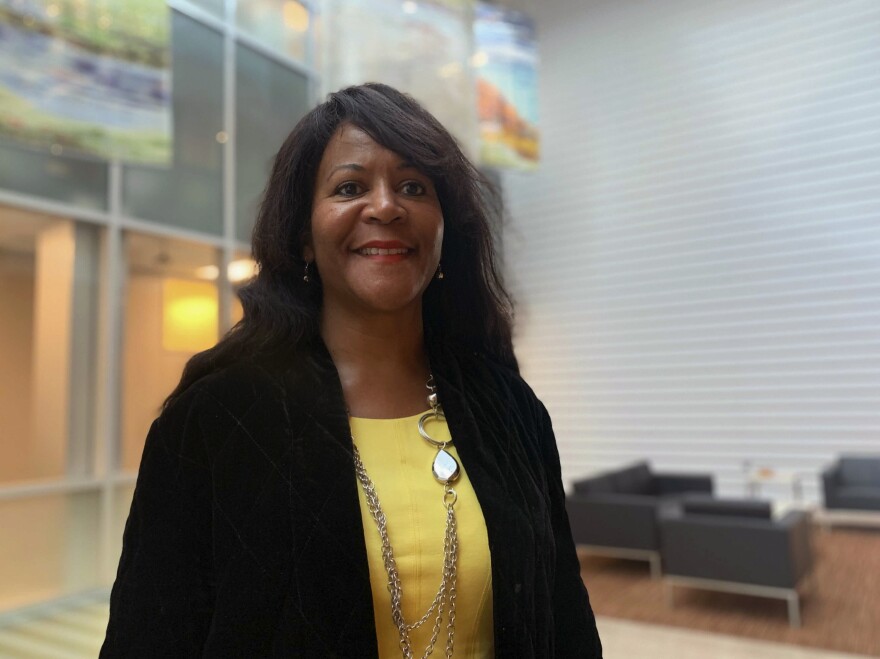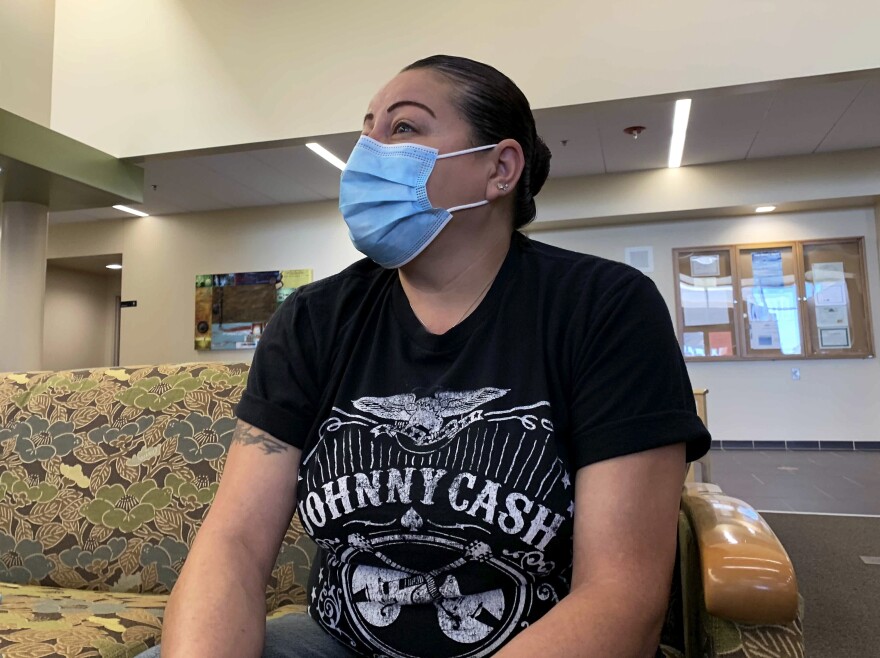Shoppers and diners are slowly returning to Albuquerque's trendy Nob Hill neighborhood.
It's a welcome sign to Mike and Kathy Holmberg of Arizona, who are on their first visit back to New Mexico since the start of the pandemic. They typically spend summers here in the mountains where it's cooler. But the couple also noticed New Mexico feels much more cautious than Arizona. Restaurants here still require customers to give their name and phone number for contact tracing. Businesses still operate under strict capacity limits.
"You see most people wearing masks yet, most businesses are requiring it," Mike Holmberg says. "Arizona's a lot more wide open."
The Holmberg's, who are fully vaccinated, say they feel safer here. Neighboring Arizona is still near the top in the nation for cases per capita but closer to the bottom when it comes to vaccinations.
In fact, New Mexico has emerged as a lone standout among Sunbelt states that tend to have the lowest vaccination rates in the nation. Generally, the restrictions are far tighter than in surrounding states run by Republican governors.
Here, some counties are close to vaccinating 90% of their adult populations. New Mexico has been one of the top-10 states for vaccination rates for weeks now. Democratic Gov. Michelle Lujan Grisham, who was the former state health secretary, has said the state's restrictions will only be fully lifted after 60% of adults are fully inoculated.

"We have been really cautious in this state to make sure we really contain this virus," says Dr. Tracie Collins, the current secretary of the New Mexico Department of Health. "We are aware of what it takes to save this state and that's what we're doing."
About 40% of New Mexicans are on Medicaid and a large chunk of the population is considered vulnerable due to preexisting health issues.
But the flip side of that is that the state has long invested in its public health system. Collins says they adapted and responded to COVID-19 quickly, with efficient testing. When the vaccines came online, there was only one central database and place to sign up run by the state, which has been credited with eliminating the early confusion and chaos seen in many other states.
"There was a lot of messaging to help people understand the importance of this vaccine as our way of getting back to something that seems normal, after having gone through a year of just, you know, torment," Collins says.
Nationally, public health experts also credit New Mexico's success to it prioritizing getting the vaccine out to the most vulnerable, often tribal and rural communities. Leave the cities, and the vaccination numbers do tend to go down, but not nearly as much as rural America writ large.
Reaching the most vulnerable
In Guadalupe County, population 3,500 not including the private prison, close to 70% of the adult population has now had at least one shot. The county skews older, sicker and some folks in the more remote areas still rely on poorly ventilated wood stoves for heat, according to Christina Campos, administrator at the Guadalupe County Hospital.
The 10-bed public hospital is the only place to get the vaccine as well. One mass vaccination event earlier this year drew about 800 people.
"They trust us to take good care of them and we really pushed the vaccines," Campos says.
On a recent morning when some in the community were returning to the hospital for their booster shots, Campos noted that trust in institutions and the government remains strong in her rural county. The government isn't seen as overreaching, which she figured was a big reason why New Mexico has weathered the pandemic better than many other states.
Generally people here are taking the virus seriously.
"This area is an incredibly culturally conservative area but Democrat," Campos says. "It's just very different from many other states."
Outbreaks are still happening
Of course, rural New Mexicans also took it seriously because they were hit hard, especially in places like the Navajo Nation. Over the past year, Guadalupe County saw three big spikes with numerous hospitalizations. Recently, health officials here watched with frustration as outbreaks occurred after large family gatherings around Cinco de Mayo and Mother's Day. The high school graduation had to be postponed as a result.
"It's been very hard," says Erlinda Saiz, as she waited in the lobby while her 18-year-old son, Ruben, got his second Moderna shot.
Her teen daughters are home with the virus. They think they got it from their grandparents who aren't vaccinated. Saiz's father-in-law is still sick at home but her mother-in-law recently had to be transferred to a hospital in the Albuquerque area. She's wringing her hands with worry. She's a supervisor at a long term care facility so she's been vaccinated since February.
"I got the vaccine to make sure to protect the seniors and my kids but obviously it's not enough," Saiz says.

Just like in most other states, vaccination rates in New Mexico have started plateauing lately. Multiple health leaders interviewed for this story expressed frustration seeing outbreaks still happening when there is a readily accessible, free prevention tool widely available.
"I'm concerned that a single other person will get COVID and die from COVID," says Jason Mitchell, the chief medical officer at Presbyterian Health, the largest hospital system in the state. "We now have an essentially preventable disease and for those that are vaccinated the pandemic is over. And for those that are not vaccinated, it's still raging."
A return to "normal"
Health officials are hopeful that a newly launched state lottery will encourage more people to get shots in their arms. Many businesses are also eager for the state to fully reopen. The governor has set a target date of the end of this month for hitting the 60% mark, triggering a full return to pre-pandemic life, or some semblance of it.
Back in Albuquerque's Nob Hill, along Central Ave., the economic toll of the pandemic is real.
"If you walk up and down, we have quite a few vacancies," says Anthony Chavez. "Nobody is moving in."
Chavez, who owns First Choice Consignment and Decor, was setting out some items for sale on the sidewalk in front of his shop before opening. Kelly's Brew Pub next door to him is now permanently closed. He used to rely on spillover customers from that bar and another shuttered restaurant across the street.
Only the flower shop next door is flourishing. Chavez is lucky if he'll get two or three customers a day anymore.
"Tough is not the word, I mean, I'm at the point of, do I want to keep the business or sell my home?" he says.
As a business owner, Chavez has barely survived New Mexico's efforts to keep the virus contained. He hopes the state's high vaccination rate means customers return soon. His unemployment runs out in July.
Copyright 2021 NPR. To see more, visit https://www.npr.org.






